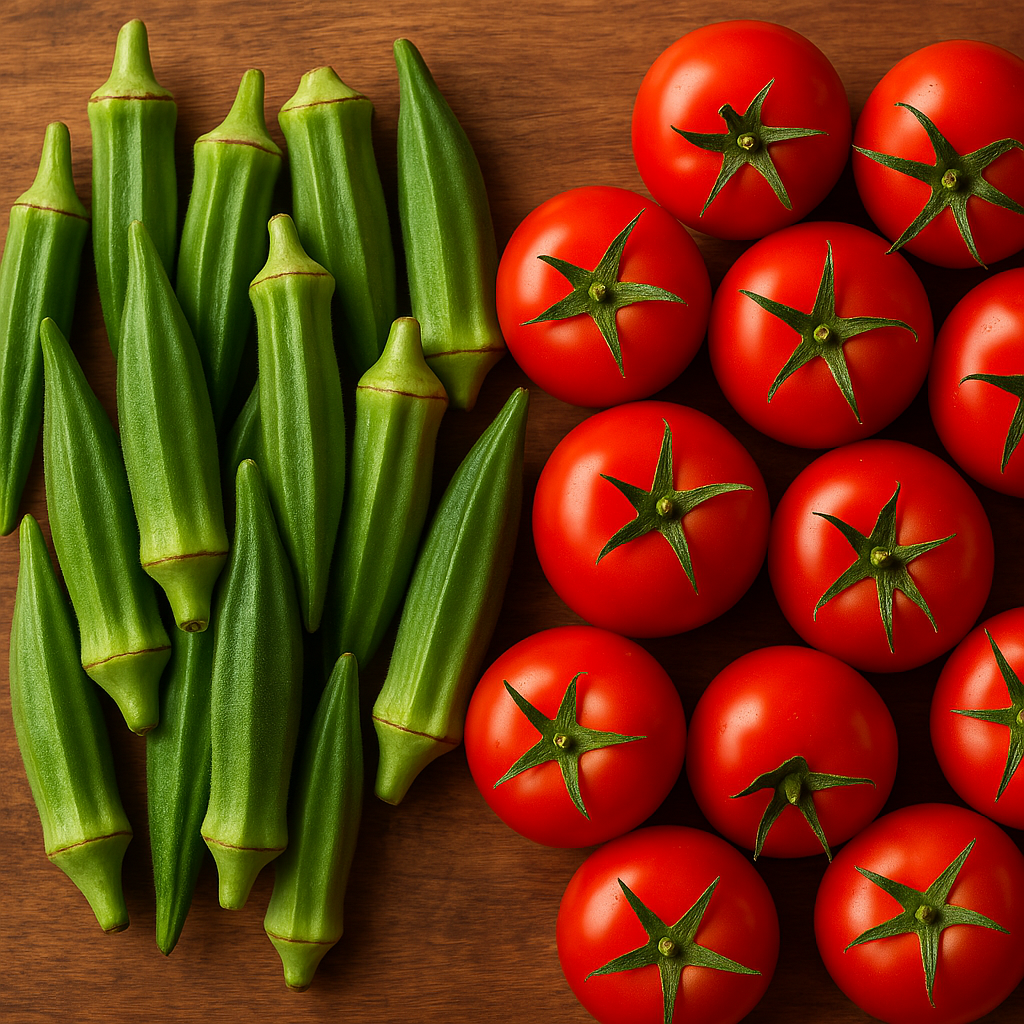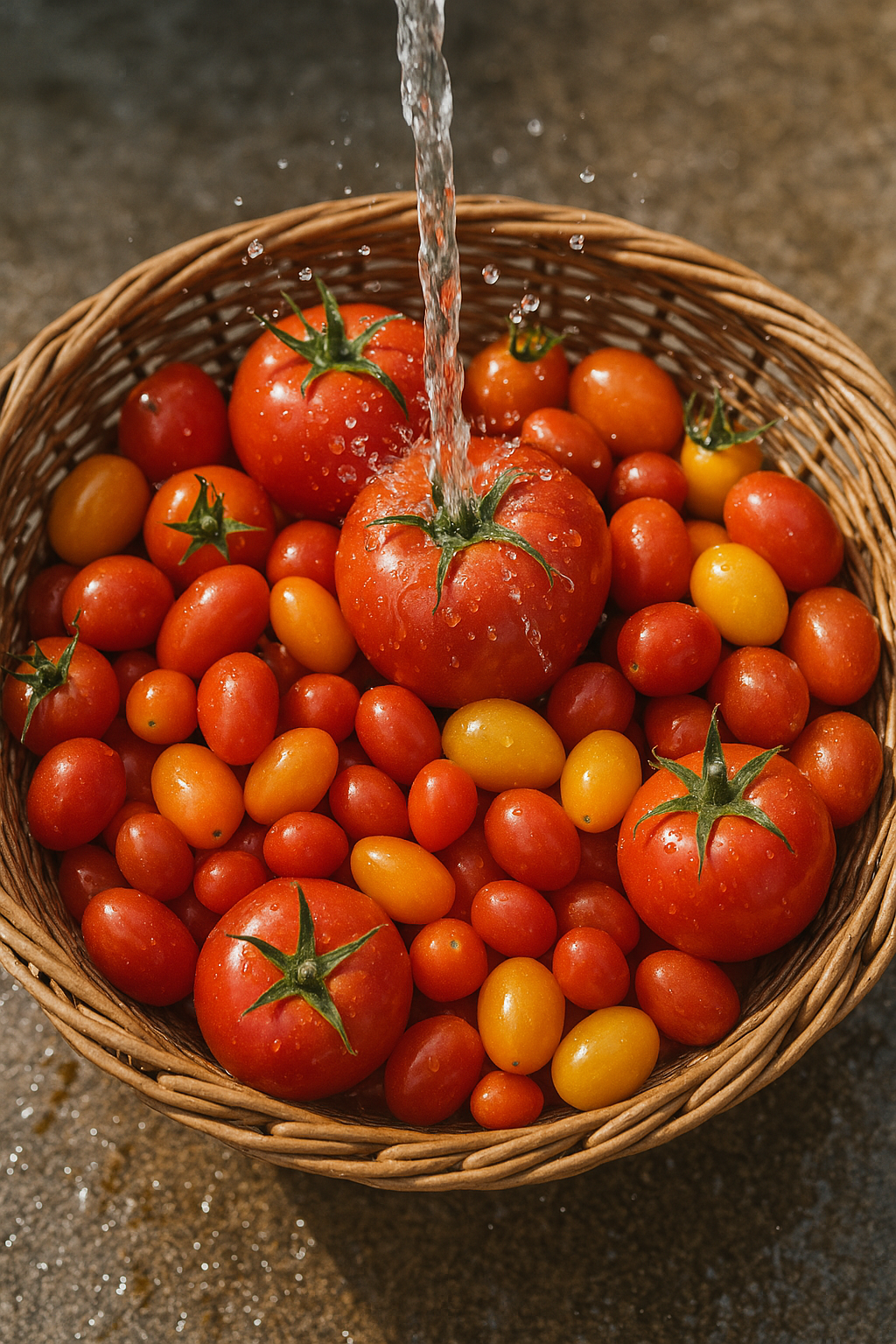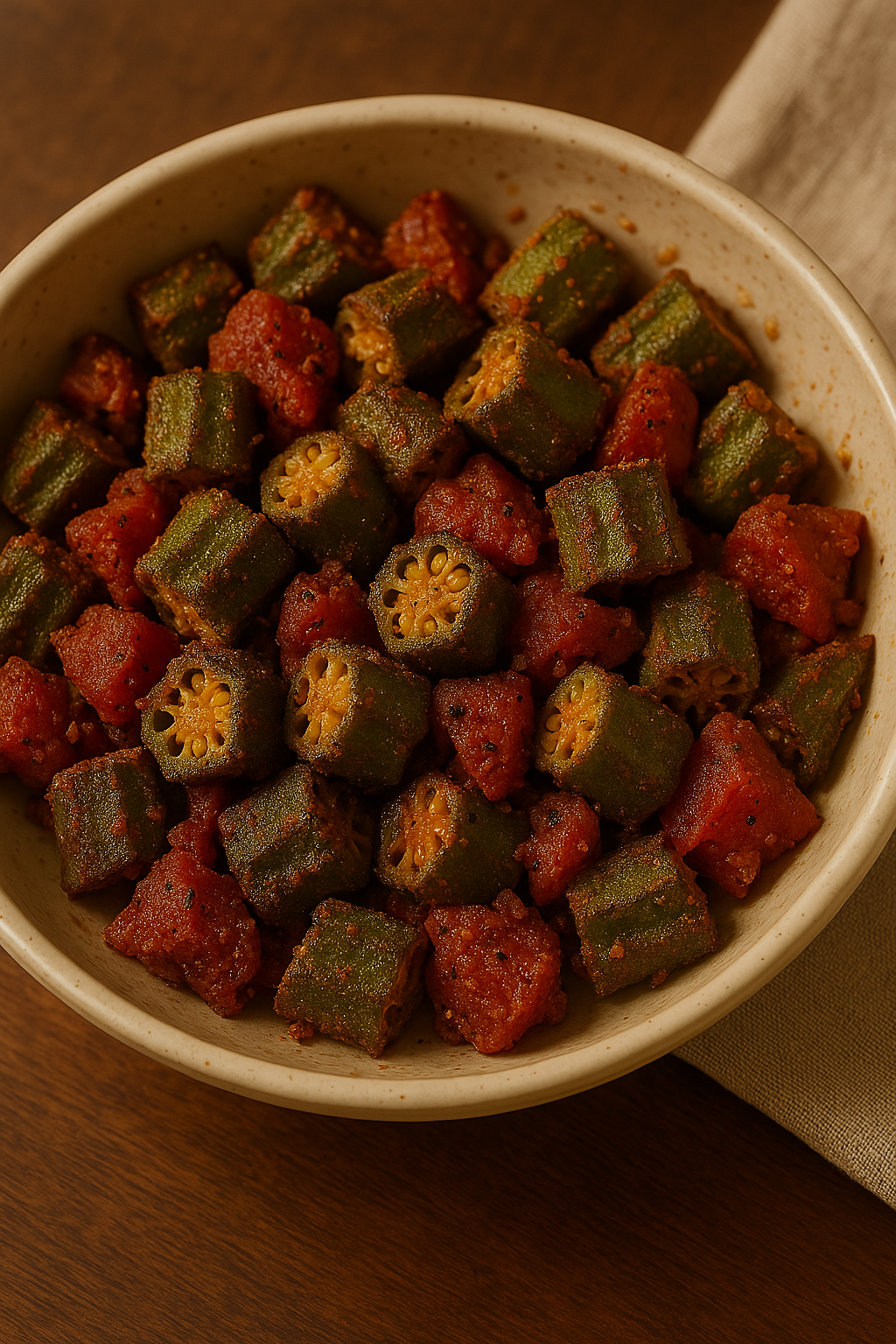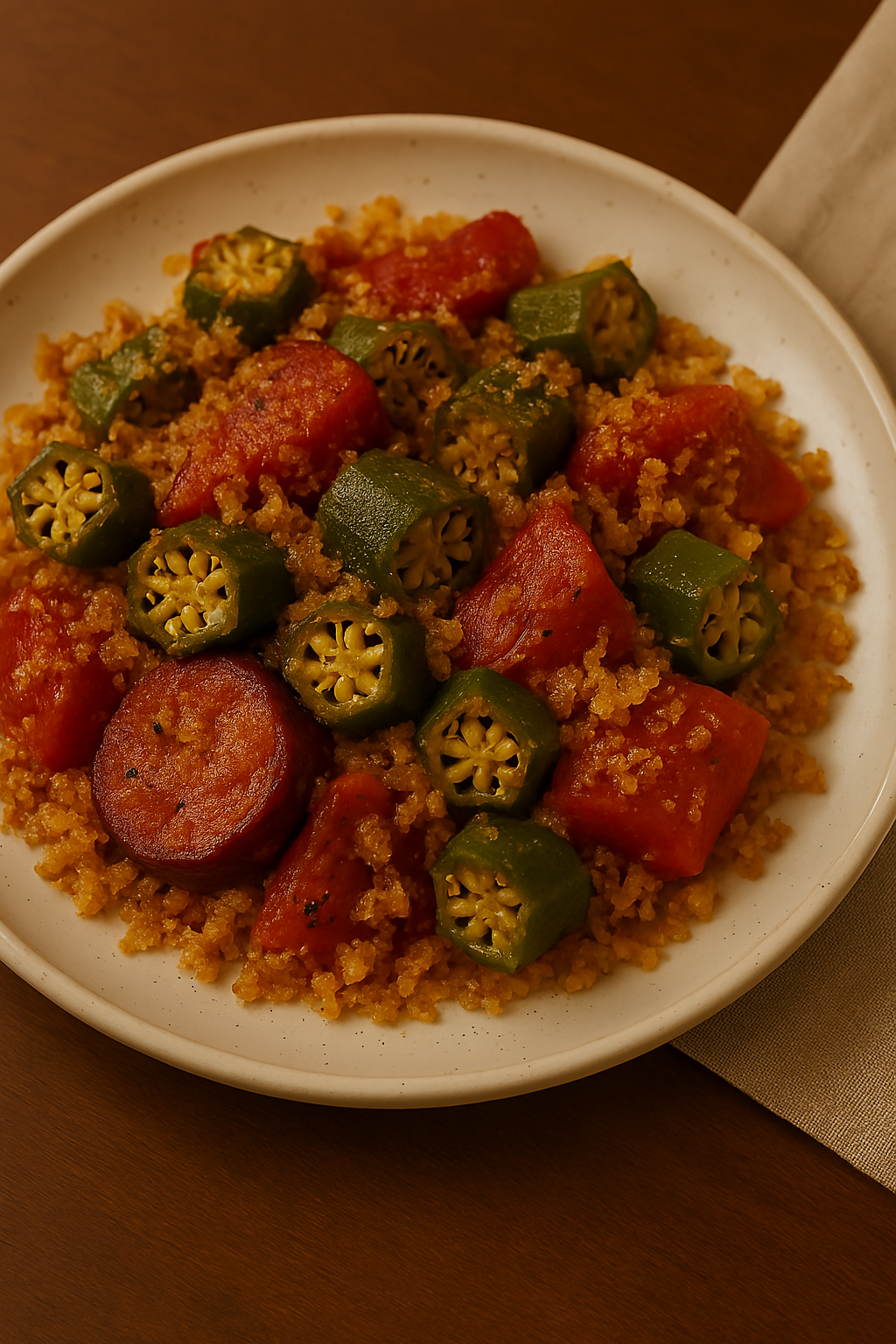Okra and tomatoes—a pairing as timeless as peanut butter and jelly in Southern kitchens. This vibrant, flavorful dish combines the grassy green crunch of okra with the sweet acidity of ripe tomatoes, simmered into a savory stew that reflects centuries of culinary tradition.
Whether served as a side or a main course with rice or cornbread, this dish brings together African, Native American, and European influences into one soulful pot.
In this article, we’ll explore the origins of okra and tomatoes, break down their nutritional value, provide step-by-step cooking instructions, and offer variations for all kinds of diets and tastes.
The History of Okra and Tomatoes
Table of Contents

Okra is believed to have originated in Northeast Africa, particularly Ethiopia, where it has been cultivated since ancient times.
The seed pods eventually made their way to the Middle East, India, and across the Atlantic to the Americas during the transatlantic slave trade. Enslaved Africans brought not only okra seeds but also knowledge of how to cook them, giving rise to a variety of traditional dishes in the American South.
Tomatoes, on the other hand, are native to South and Central America and were introduced to Europe and Africa after the Spanish colonization of the Americas. It wasn’t long before tomatoes found a comfortable home in Southern gardens and kitchens.
Together, okra and tomatoes became a natural pairing—especially in regions like Louisiana, Georgia, and the Carolinas—where stews, braises, and gumbos reign supreme.
Nutritional Benefits Of Okra and Tomatoes

Okra and tomatoes are both low in calories and rich in essential nutrients.
Okra is high in:
- Fiber (great for digestion)
- Vitamin C and A
- Folate
- Antioxidants such as polyphenols
Tomatoes are excellent sources of:
- Vitamin C and K
- Potassium
- Lycopene, a powerful antioxidant linked to heart health and cancer prevention
Together, they make a dish that is not only delicious but also nutrient-dense, gluten-free, and easily adapted to vegetarian or vegan diets.
Choosing and Preparing Ingredients
Selecting Okra
When buying fresh okra, look for small, firm pods (2–4 inches long). Larger pods may be tough and woody. Avoid any that look dried out or overly soft. You can also use frozen okra, which is a convenient option for off-season cooking.
Selecting Tomatoes
Fresh, ripe tomatoes are ideal. Roma, plum, or heirloom varieties work particularly well. In the off-season, canned tomatoes (especially San Marzano) make a reliable substitute.
Additional Ingredients
- Traditional recipes often include:
- Onion and garlic for aromatics
- Bell pepper or celery for depth
- Bacon or smoked sausage for flavor (optional)
- Vinegar or lemon juice to brighten
- Spices such as thyme, paprika, cayenne, or bay leaf
Basic Southern Okra and Tomatoes Recipe
Ingredients
- 1 lb fresh okra, sliced into ½-inch pieces
- 1 lb fresh tomatoes, chopped (or 1 can of diced tomatoes, undrained)
- 1 medium onion, chopped
- 2 cloves garlic, minced
- 2 tbsp olive oil or bacon drippings
- Salt and pepper to taste
- ½ tsp smoked paprika
- 1 tsp sugar (optional, to balance acidity)
- 1 tbsp apple cider vinegar (optional)
- Crushed red pepper flakes (optional, for heat)
Preparing Okra and Tomatoes

Prepare the Vegetables
Wash and dry the okra thoroughly to reduce sliminess. Slice off the tops and tips, then cut the pods into even pieces. Dice the tomatoes and onions, and mince the garlic.
Sauté Aromatics
In a large skillet or Dutch oven, heat the oil over medium heat. Add the chopped onions and cook until soft and translucent, about 5 minutes. Add garlic and cook for another 30 seconds.
Add Tomatoes
Stir in the chopped tomatoes (with their juices). Season with salt, pepper, paprika, and a pinch of sugar if needed. Let the mixture simmer for 10 minutes until the tomatoes break down.
Add Okra
Add the okra to the tomato mixture. Stir well, reduce the heat to low, and cover. Cook for 15–25 minutes, stirring occasionally, until the okra is tender. If using vinegar, stir it in during the last 5 minutes of cooking.
Taste and Serve
Taste for seasoning and adjust salt, pepper, or acidity as needed. Serve hot as a side dish, over rice, or with cornbread.
Tips for Reducing Okra’s Sliminess
Okra gets a bad reputation for being slimy, but you can minimize the mucilage (the substance responsible) with a few techniques:
- Keep it Dry – Wash okra just before cooking and dry it thoroughly.
- High Heat – Frying or roasting okra before stewing can reduce slime.
- Acid – Add tomatoes, lemon juice, or vinegar early in cooking—they help break down mucilage.
- Avoid Over-Stirring – Stirring okra too often releases more mucilage.
Recipe Variations of Okra and Tomatoes

-
With Bacon or Sausage
For a meaty variation, fry 3–4 slices of chopped bacon or some andouille sausage in the pan before adding onions. Remove meat to a plate, cook veggies in the drippings, then return the meat at the end.
-
Vegan and Gluten-Free
Skip meat and ensure your seasonings are gluten-free. Add a can of chickpeas for extra protein.
-
Indian-Inspired
Sauté with cumin seeds, turmeric, and garam masala. Swap tomatoes for crushed canned tomatoes, and finish with chopped cilantro.
-
Creole Style
Add chopped green bell pepper and celery (the “holy trinity” of Creole cooking), and season with thyme, cayenne, and a bay leaf.
-
Roasted Version
Toss okra and tomatoes in olive oil and roast at 400°F (200°C) for 25–30 minutes. Finish with balsamic vinegar and fresh basil.
Serving Suggestions of Okra and Tomatoes
- Okra and tomatoes can be served in a variety of ways:
- Over white rice or grits
- Alongside fried catfish or grilled chicken
- With a wedge of buttery cornbread
- Topped with crumbled feta or goat cheese
- As a bed for poached or fried eggs
- It’s a versatile dish that fits into breakfasts, lunches, or hearty dinners.
Storage and Reheating
Leftovers can be stored in an airtight container in the fridge for up to 4 days. The flavor deepens with time, making it even better the next day. To reheat, warm gently in a saucepan over low heat or microwave in 30-second increments, stirring occasionally.
Wrapping Up
Okra and tomatoes is more than a recipe—it’s a story of heritage, resilience, and cultural exchange. Simple yet rich in flavor, it offers endless opportunities to customize and adapt, whether you’re feeding a family or cooking solo.
With just a few ingredients and a single pot, you can create a dish that’s comforting, healthful, and deeply satisfying. So the next time you spot okra at the market or have extra tomatoes on hand, remember this humble pairing—and let it simmer into something special.
Leave a Reply